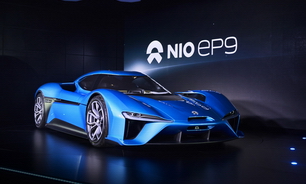China’s government is putting its might behind establishing the country at the forefront of new-energy vehicles.

Khodrocar - Already, Chinese drivers buy more new cars -- and more electric vehicles -- than anywhere else. With the major automakers all preparing for an electric future, there’ll be no shortage of competition, including within China -- as underlined by the purchase of a stake in Daimler AG by a Chinese car billionaire.
1. Can I buy a Chinese electric vehicle?
If you live outside China, you will struggle to find one. But this is a business in its infancy, with technological advances -- spurred by gigantic research budgets -- likely to translate in the next decade into cheaper and more appealing cars with longer driving ranges. Expect more Chinese electric vehicles to appear in a showroom near you within the next few years.
2. What about in China?
The electric car boom is gathering pace, with sales doubling in 2017. Global annual sales exceeded 1 million for the first time last year -- China accounted for more than half. And that’s just a taster: The government is targeting 7 million vehicles by 2025. Some of the major domestic manufacturers include the Warren Buffett-backed BYD, SAIC Motor, BAIC Motor, Great Wall Motor and Geely Automobile. In the luxury bracket, Chinese startup NIO is positioning itself as a Chinese challenger to Tesla Inc.
3. Why the big push for new-energy vehicles?
Not only is China grappling with pollution and worried about climate change, its leaders want to move away from gasoline because the country’s heavy dependence on imported oil is seen as a key strategic vulnerability. An auto industry plan released last year envisages NEVs making up all the future sales growth in the country. China is considering ending production and sales of automobiles powered by gasoline and diesel in the future.
4. What is China doing to promote the industry?
It’s giving incentives to buyers and imposing quotas on manufacturers. Carrot-wise, China hands a 10 percent tax rebate to NEV purchasers. Provincial governments also offer subsidies, combining to knock off, for example, $12,000 from the cost of a new BYD e5. Stick-wise, China’s bringing in tougher vehicle emission rules and introducing quotas from 2019 that will require manufacturers to buy credits or face fines if they miss targets for producing zero- and low-emission cars. Battery-powered cars are mopping up most of the demand as subsidies are skewed more toward those vehicles than hybrids.
5. What are foreign automakers doing?
China’s weighty import tax -- 25 percent for cars -- means they must produce within China to make vehicles mass-market affordable. Ford Motor Co. and Volkswagen AG have formed joint ventures in China, while Tesla founder Elon Musk has proposed to build a factory there. The chairman of Geely Automobile Holdings Ltd. disclosed a 9.7 percent stake in Daimler in February, an investment partly motivated by the German company’s electric know-how. (Daimler has a stake in BAIC). An experiment to allow foreign carmakers to set up wholly-owned EV businesses in China’s free-trade zones is coming. That’s seen as a possible first step to gradually lowering import tariffs.
6. Can China become a global motor hub?
It tried with gasoline cars without success. But electric vehicles may be different, particularly since the industry’s youthfulness presents more of an even playing field. Combine that with the expected surge in Chinese demand (car sales actually fell in the U.S. in 2017) and the government’s support, and it’s possible to see a global industry with China much more than a bit player. South Korean manufacturers have shown how car markets can be upended with high-quality, well-priced products. Now, it’s up to China to deliver.
Source: Bloomberg.com
Latest News


